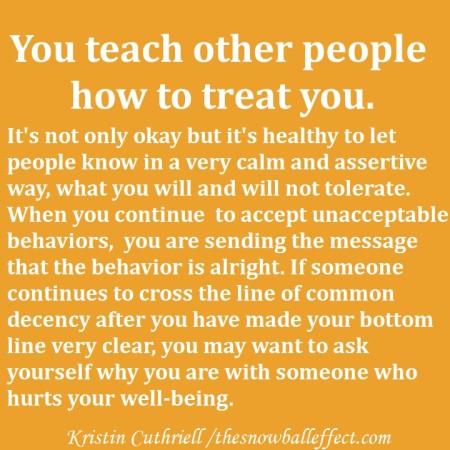 If someone continues to cross the line of common decency after you have calmly and assertively made your bottom-line very clear, you may want to ask yourself why you are with someone who harms your well-being.
If someone continues to cross the line of common decency after you have calmly and assertively made your bottom-line very clear, you may want to ask yourself why you are with someone who harms your well-being.
Boundary violators usually find ways to justify their actions. They may minimize or deny the boundary violations. They may blame their victims for their actions. They may apologize until tension builds and boundary violations occur once again. They may not view their actions as violating. The important thing to know is that the reason they are crossing your boundaries becomes irrelevant if you have made your bottom-line clear and the unacceptable behavior continues.
By tolerating an unacceptable behavior, you send the message that it really is acceptable. If you ask someone not to do something to you and they continue, it is a personal boundary violation regardless of who agrees and disagrees with you.
How to Stop Boundary Violations
1. Identify that your boundary has been crossed by the way it makes you feel. (Scared, Angry, Uncomfortable, Violated)
2. Calmly and assertively tell the person that you don’t like the behavior and ask them not to do it again. (Use “I” statements. I feel _____ when…..) (Please don’t ever do that again.)
3. If it happens again, you need to decide if you want to give the person another warning. Many times this depends on the severity of the violation and the damage it is causing you or the ones you love.
4. If it continues to happen after you have been very clear, decide whether you want to accept the behavior or remove yourself from the relationship. You can get professional counseling, and you can encourage the other person to get professional counseling, but you cannot force another person to change.
Sometimes the decision is easy and sometimes it can be very difficult. Do I accept this behavior that hurts my well-being or do I remove myself from this relationship?
You teach people how to treat you by showing them what you will and will not tolerate.
This post was written by Kristin Barton Cuthriell, MEd, MSW, LCSW. Kristin works as a psychotherapist and is the author of the popular book, The Snowball Effect: How to Build Positive Momentum in Your Life. To find out more and read the Amazon reviews, click here. The Snowball Effect helps you build positive momentum in all areas of your life one baby step at a time.
I visualize putting a fence around myself ( a literal boundary, right?) and when someone continually ignores it, which is a huge red flag to me, totally disrespectful in fact, I disengage from that person. they are not someone I want in my life. This has served me well, cos I won’t tolerate behavior that’s harmful to me. Great post about an important topic!
It sounds like it has served you well! I hope you have a good day!